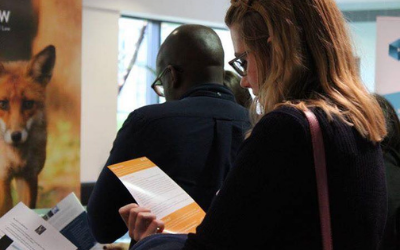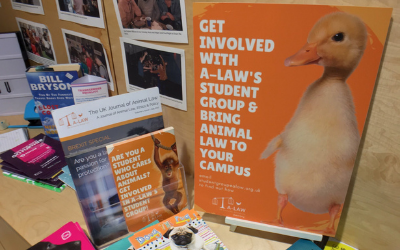Dr. Darren Calley
Darren is a Lecturer at the University of Essex, where he was awarded a Doctorate for his PhD in the utility of Regional Fisheries Management Organisations and CITES in addressing Illegal, Unreported and Unregulated fishing in the high seas.

Darren is a Lecturer at the University of Essex, where he was awarded a Doctorate for his PhD in the utility of Regional Fisheries Management Organisations and CITES in addressing Illegal, Unreported and Unregulated fishing in the high seas. He teaches animal welfare law as part of the Environmental Law and Public International Law undergraduate modules.
Did you always know you wanted to be an academic?
I embarked upon my legal studies with the aspiration of become a solicitor specialising in criminal defence work, particular in the sphere of civil liberties and public order. From Year 2 of my undergraduate degree, however, it became clear that I was probably better suited to academia than practice.
When did you decide you wanted to focus on Animal Law?
Right from the outset of my legal studies I concentrated indirectly on animal law. My early career aspirations were almost entirely driven by my experiences in the animal protection movement: seeing (and feeling) police officers wielding batons at various animal protection demonstrations in the mid-1990s drove me on initially. At that time my view of the law was that it was something that those who harmed animals used to legitimise their actions and quell dissent. Some might say that things haven’t really changed much in 20 years!
How did you get into Animal Law?
I am completely self-taught. One of the most frustrating things for me as a law student was the lack of specific animal protection law in the undergraduate curriculum. Instead we might occasionally consider biodiversity and the living environment in Environmental Law, or issues relating to animals in Criminal Law or Public Law (particularly ex parte Fewings, and International Traders Ferry – two big cases from the 1990s). It was only when I undertook my PhD that I realised that laws existed outside the UG curriculum and, if I was willing to put in the hours, I might have a chance of understanding them. I have been extremely fortunate that the University of Essex have encouraged me and given me the opportunity to develop this know through teaching and research for the last 5 or 6 years and given me the opportunity to correct the lack of animal protection law on the LLB curriculum.
How much of your focus is Animal Law?
If I am honest, it is the thing that drives me and I realise that the more I learn the more there is to know: I am fairly confident that even if I am lucky enough to keep working in this area until I retire I will never know it all.
What is the rest of your focus?
My main teaching role is the Law of Negligence, although I am also a Lecturer in Public International Law (especially the Law of the Sea and the protection of what are euphemistically referred to as ‘marine living resources’ – fish, birds, turtles, dolphins etc to you and I.) Tort is a fantastic subject to teach and I am very lucky to have responsibility for such an interesting module and I find (amongst other things) the theoretical challenges posed by the Law of the Sea incredibly stimulating.
How is your day at work spent?
The academic year is cyclic: at present the final term of the year is drawing to a close and I have been marking exam scripts all day. When these are finished I will be putting the final polish on and responding to the reviewer’s comments on an article that I submitted for publication. Generally – that is in term time – much of my time will be taken up either preparing classes or teaching these classes, seeing students or dealing with their questions via email. Academics are required to engage in research so when I am not teaching I will usually be writing articles or chapters for books.
What animal welfare work are you most proud of?
Being something of a pessimist I take the view that whilst animals still suffer under the law there is not much to be proud of. But, in reality, I do take a great deal of pleasure from teaching animal protection law and (hopefully) inspiring a generation of lawyers to take animal issues seriously.
Do you enjoy the work?
Subject to the proviso above regarding teaching, I would say no, to be honest. Perhaps I am a little over sentimental but I find the majority of what I do in relation to animal protection law pretty heart-breaking: it is never a case of ‘and they all lived happily ever after…’ Animal law often involves reading graphic accounts of brutality, cruelty and barbarism: if ever I enjoyed that I would have to change career.
What tips would you give to students who want to practice in this area?
Whilst the choice of University is really important and only a handful of University Law Schools offer animal law variants as part of their curricula, the key things are, I think, focus and determination. If animal protection matters to you and you are prepared to teach yourself then whichever University you go to you will be given many of the skills you need. Whilst I am a teacher and researcher into the area of ‘animal protection law’ there is a school of thought which says that there is no such thing as Animal Law – it is just public law, criminal law, EU law, or tort etc that happens to deal with the issue of animals. I don’t necessarily agree with this, but I cannot deny that if you do want to be ‘animal lawyer’ be prepared to become an expert in as many different branches of law as you can – one day you will be struggling through an astonishingly long-winded EU Regulation, the next you might be grappling with the mens rea of the criminal offence of causing unnecessary suffering, then the following day you might be mulling over a particularly complicated judicial review.
Follow Us !
WE NEED YOUR SUPPORT
We rely upon membership income and donations to carry out our work. Please join us or donate and support our work.
Become a Volunteer! If you like what we’re doing…
why not find out about the different ways you can get involved in our important work?






